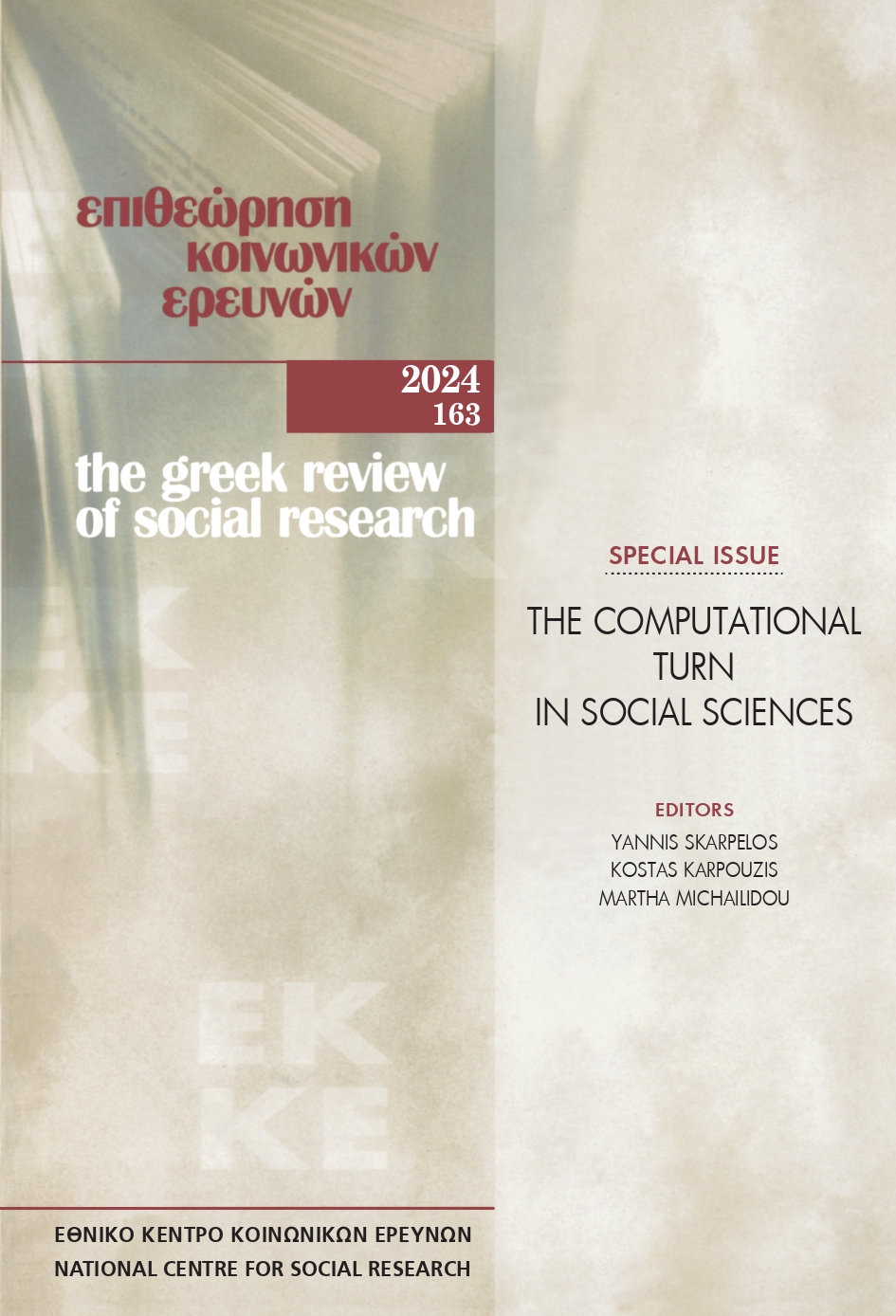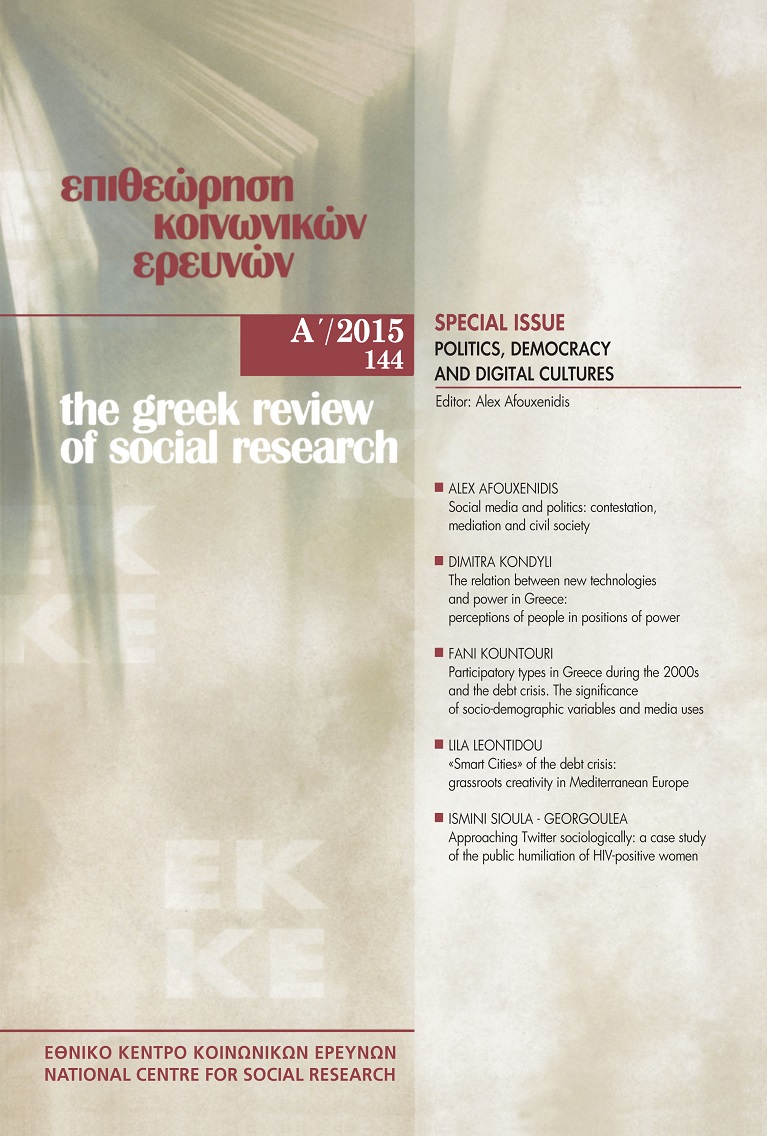Προκλήσεις και ευκαιρίες για την επανάχρηση νέων μορφών δεδομένων σε ένα μεταβαλλόμενο τοπίο

Περίληψη
Τα τελευταία δεκαπέντε χρόνια η τεχνολογία συνέβαλε στην εμφάνιση νέων τύπων δεδομένων, ιδίως μεγάλων δεδομένων, που επηρεάζουν τις μεθόδους παρατήρησης/μελέτης/μέτρησης των κοινωνικών φαινομένων από την πλευρά των κοινωνικών επιστημών. Η αυξανόμενη ψηφιοποίηση των κοινωνικών δραστηριοτήτων παράγει τεράστιες ποσότητες δεδομένων που τροφοδοτούν τον προβληματισμό για τον τρόπο λειτουργίας των σύγχρονων κοινωνιών. Επιπρόσθετα, παράγοντες όπως η πρόσφατη πανδημία Covid-19 με την αναγκαστική κοινωνική αποστασιοποίηση συνέβαλαν στη δημιουργία μιας επιπλέον ευνοϊκής συγκυρίας έτσι ώστε να εισέλθουν πιο εντατικά στο προσκήνιο νέοι τύποι δεδομένων με έμφαση στα μεγάλα δεδομένα. Στο πλαίσιο του διαρκούς μετασχηματισμού του τοπίου των δεδομένων, θα επιχειρήσουμε να θέσουμε ερωτήματα που σχετίζονται με το περιβάλλον των Αποθετηρίων Δεδομένων/ Ερευνητικών Υποδομών και τα μέσα /τρόπους αντιμετώπισης και διαχείρισης αυτών των δεδομένων. Φαίνεται ότι η κοινωνική έρευνα στρέφεται προς μια πιο ‘‘καθοδηγούμενη από τα δεδομένα προσέγγιση’’, η οποία προϋποθέτει νέες δεξιότητες και ικανότητες στο σταυροδρόμι των υπολογιστικών και κοινωνικών επιστημών. Ένα από τα μείζονα ζητήματα που αναδεικνύονται είναι η δυνατότητα συνεργασιών μεταξύ οργανισμών δεδομένων και ερευνητών/χρηστών των δεδομένων προκειμένου να προωθήσουν όχι μόνο μια κουλτούρα κοινής χρήσης δεδομένων, αλλά και επανάχρησης αυτών. Η εργασία αυτή βασίζεται σε πρωτογενείς και δευτερογενείς πηγές που έχουν παραχθεί στο πλαίσιο ερευνητικών έργων σε συνεργασία με το CESSDA ERIC (European Social Science Data Archives- European Research Infrastructures), καθώς και σε βιβλιογραφία αναφορικά με τη διαχείριση δεδομένων προερχόμενων από διαφορετικές πηγές με έμφαση στις νομικές/ηθικές και τεχνικές πτυχές τους.
Λεπτομέρειες άρθρου
- Πώς να δημιουργήσετε Αναφορές
-
Kondyli, D., & Klironomos , N. (2024). Προκλήσεις και ευκαιρίες για την επανάχρηση νέων μορφών δεδομένων σε ένα μεταβαλλόμενο τοπίο. Επιθεώρηση Κοινωνικών Ερευνών, 163, 193–219. https://doi.org/10.12681/grsr.38517
- Ενότητα
- Άρθρα

Αυτή η εργασία είναι αδειοδοτημένη υπό το CC Αναφορά Δημιουργού – Μη Εμπορική Χρήση 4.0.
Οι συγγραφείς των άρθρων που δημοσιεύονται στην Επιθεώρηση Κοινωνικών Ερευνών διατηρούν τα δικαιώματα πνευματικής ιδιοκτησίας επί των άρθρων τους, δίνοντας στο περιοδικό το δικαίωμα της πρώτης δημοσίευσης. Άρθρα που δημοσιεύονται στην Επιθεώρηση Κοινωνικών Ερευνών διατίθενται με άδεια Creative Commons 4.0 και σύμφωνα με την άδεια μπορούν να χρησιμοποιούνται ελεύθερα, με αναφορά στο/στη συγγραφέα και στην πρώτη δημοσίευση για μη κερδοσκοπικούς σκοπούς.
Το Εθνικό Κέντρο Κοινωνικών Ερευνών διατηρεί το δικαίωμα να δημοσιεύει, να αναπαραγάγει, να παρουσιάζει στο κοινό, να διανέμει και χρησιμοποιεί άρθρα που δημοσιεύονται στην Επιθεώρηση Κοινωνικών Ερευνών σε οποιοδήποτε μέσο και μορφή είτε μεμονωμένα είτε ως μέρη συλλογικών έργων, για όλο τον χρόνο διάρκειας προστασίας της πνευματικής ιδιοκτησίας και για όλες τις χώρες του κόσμου. Αυτό περιλαμβάνει ενδεικτικά και όχι αποκλειστικά το δικαίωμα δημοσίευσης των άρθρων σε τεύχη της Επιθεώρησης Κοινωνικών Ερευνών, αναπαραγωγής και διανομής μεμονωμένων αντιγράφων των άρθρων, αναπαραγωγής ολόκληρων των άρθρων σε άλλη έκδοση του Εθνικού Κέντρου Κοινωνικών Ερευνών, καθώς και αναπαραγωγής και διανομής των άρθρων ή περίληψης αυτών με χρήση πληροφορικού συστήματος αποθετηρίου.



